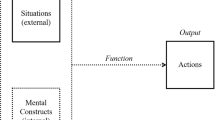Abstract
In this paper I argue the best examples of the methods in the evolutionary social sciences don’t actually resemble either of the two methods called “Adaptive Thinking” or “Reverse Engineering” described by evolutionary psychologists. Both AT and RE have significant problems. Instead, the best adaptationist work in the ESSs seems to be based on and is aiming at a different method that avoids the problems of AT and RE: it is a behavioral level method that starts with information about both the trait in question and knowledge of the EEA. I describe some examples from the literature, and suggest how a behavioral level ESS might still contribute to the discovery and understanding of human psychology. Finally, I describe some remaining problems for adaptationist reasoning of this kind.
Similar content being viewed by others
Notes
By “evolutionary psychologists” I mean here the so called “Santa Barbara” school of evolutionary psychology with its specific commitments to massive modularity, a Pleistocene EEA and so on. The “evolutionary social sciences” is the term I use to refer to what many philosophers call “evolutionary psychology” more broadly: a range of projects that aim to use evolutionary thinking to understand both the origins and nature of human behavior and cognition, these include evolutionary psychology proper as well as human behavioral ecology, dual inheritance theory, evolutionary behavioral economics, and so on.
There may, of course, be multiple adaptive responses to any adaptive problem posed by some set of conditions, especially where those conditions include the behaviors of other individuals.
For a discussion of the relative merits of studying behavioral strategies vs. psychological mechanisms and the role of each in evolutionary social science, see Driscoll (2004).
This appears to be a genuinely psychological level claim: I’ll return to this shortly. In this part of the project Bowles and Gintis don’t do a lot with it, and mostly concern themselves with describing the resulting behavioral strategies.
References
Blurton Jones NG (1987) Tolerated theft, suggestions about the ecology and evolution of sharing, hoarding and scrounging. Soc Sci Inf 26:31–54
Bowles S (2006) Group competition, reproductive leveling, and the evolution of human altruism. Science 314:1569–1572
Bowles S (2009) Did warfare among ancestral hunter-gatherers affect the evolution of human social behaviors. Science 324:1293–1298
Bowles S, Gintis H (2011) A cooperative species: human reciprocity and its evolution. Princeton University Press, Princeton and Oxford
Brandon R (1990) Adaptation and environment. Princeton University Press, Princeton
Buller DJ (2005) Adapting minds. MIT press, Cambridge
Camerer C (2003) Behavioral game theory: experiments in strategic interaction. Princeton University Press, Princeton
Camerer C, Thaler RH (1995) Ultimatums, dictators and manners. J Econ Perspect 9(2):209–219
Cosmides L, Tooby J, Barkow JH (1992) Introduction: evolutionary psychology and conceptual integration. In: Barkow JH, Cosmides L, Tooby J (eds) The adapted mind. Oxford University Press, Oxford, pp 3–15
Davies PS (1999) The conflict of evolutionary psychology. In: Hardcastle VG (ed) Where biology meets psychology: philosophical essays. MIT press, Cambridge, pp 67–81
Dennett DC (1995) Darwin’s dangerous idea: evolution and the meanings of life. Touchstone/Simon and Schuster, New York
Driscoll C (2004) Can behaviors be adaptations? Philos Sci 71:16–35
Fehr E, Gachter S (2000) Fairness and retaliation: the economics of reciprocity. J Econ Perspect 14(3):159–181
Gintis H (2000) Strong reciprocity and human sociality. J Theor Biol 206:169–179
Grafen A (1984) Natural selection, kin selection and group selection. In: Krebs JR, Davies NB (eds) Behavioural ecology: an evolutionary approach. Blackwell scientific publications, Oxford, pp 62–84
Grantham T, Nichols S (1999) Evolutionary psychology: ultimate explanations and Panglossian predictions. In: Hardcastle VG (ed) Where biology meets psychology: philosophical essays. MIT press, Cambridge, pp 47–66
Griffiths PE (1996) The historical turn in the study of adaptation. Br J Philos Sci 47:511–532
Guala F (2012) Reciprocity: weak or strong? What punishment experiments do (and do not) demonstrate. Behav Brain Sci 35:1–59
Gurven M (2004) To give and to give not: the behavioral ecology of human food transfers. Behav Brain Sci 27:543–583
Gurven M, Hill K (2009) Why do men hunt? A reevaluation of “man the hunter” and the sexual division of labor. Curr Anthropol 50:51–74
Guth W, Schmittberger R, Schwarze B (1982) An experimental analysis of ultimatum bargaining. J Econ Behav Organ 3:367–388
Hawkes K, Bliege Bird R (2002) Showing off, handicap signaling, and the evolution of men’s work. Evol Anthropol 11:58–67
Hawkes K, O’Connell JF, Coxwoth JE (2010) Family provisioning is not the only reason men hunt. Curr Anthropol 51:259–264
Henrich J, Boyd R (1998) The evolution of conformist transmission and the emergence of between-group differences. Evol Hum Behav 19:215–241
Henrich J, Gil-White FJ (2001) The evolution of prestige: freely conferred deference as a mechanism for enhancing the benefits of cultural transmission. Evol Hum Behav 22:165–196
Henrich N, Henrich J (2007) Why humans cooperate: a cultural and evolutionary explanation. Oxford University Press, Oxford
Henrich J, Boyd R, Bowles S, Camerer C, Fehr E, Gintis H (2004) Foundations of human sociality: economic experiments and ethnographic evidence from fifteen small-scale societies. Oxford University Press, Oxford
Hrdy SB (2009) Mothers and others: the evolutionary origins of mutual understanding. Belknap press, Cambridge
Kaplan H, Gurven M (2005) The natural history of human food sharing and cooperation: a review and a new multi-individual approach to the negotiation of norms. In: Gintis H, Bowles S, Boyd R, Fehr E (eds) Moral sentiments and material interests: the foundations of cooperation in economic life. MIT Press, Cambridge
Kaplan H, Hill K, Lancaster J, Hurtado AM (2000) A theory of human life history evolution: diet, intelligence, and longevity. Evol Anthropol 9:156–185
Marlowe FW (2005) Hunter-gatherers and human evolution. Evol Anthropol 14(2):54–67
Marr D (1982) Vision: a computational investigation into the human representation and processing of visual information. Freeman, San Francisco
O’Connell JF, Hawkes K, Lupo KD, Blurton Jones NG (2002) Male strategies and plio-pleistocene archaeology. J Hum Evol 43:831–872
Richardson RC (2003) Evolutionary psychology as maladapted psychology. MIT press, Cambridge
Smith EA, Bird RB (2005) Costly signaling and cooperative behavior. In: Gintis H, Bowles S, Boyd R, Fehr E (eds) Moral sentiments and material interests: the foundations of cooperation in economic life. MIT Press, Cambridge, pp 115–148
Sperber D (2000) An objection to the memetic approach to culture. In: Aunger R (ed) Darwinizing culture: the status of memetics as a science. Oxford University Press, Oxford, pp 163–173
Sterelny K (2010) Moral nativism: a sceptical response. Mind Lang 25(3):279–297
Sterelny K (2012) The evolved apprentice. MIT press, Cambridge
Sterelny K, Griffiths P (1999) Sex and death. University of Chicago Press, Chicago
Turke PW (1990) Just do it. Ethol Sociobiol 11:445–463
Author information
Authors and Affiliations
Corresponding author
Rights and permissions
About this article
Cite this article
Driscoll, C. Neither Adaptive Thinking nor Reverse Engineering: methods in the evolutionary social sciences. Biol Philos 30, 59–75 (2015). https://doi.org/10.1007/s10539-014-9466-7
Received:
Accepted:
Published:
Issue Date:
DOI: https://doi.org/10.1007/s10539-014-9466-7




